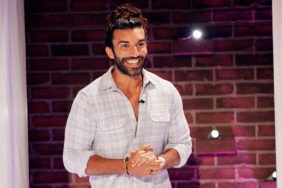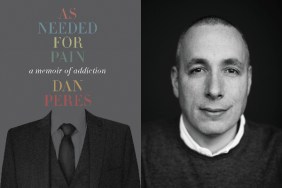Photo: Julia Papp.

What makes a man? That’s the deceptively simple question author David Szalay toys with in All That Man Is. Dubbed a new breed of novel, the book contains chapters of individual stories of male characters throughout the life span. Their ages are perhaps the biggest difference among them; as a group, however, they tend towards entitled, are fixated on accumulating wealth and sexual conquests, have families out of obligation, and mercilessly mope about their perceived failures. By the end of the book, one can’t help but wonder: Is this really the state of masculinity today?
If Szalay’s depiction of men is depressing, that of the women is even drearier. They exist as arm candy, sex toys, baby incubators, and devoted caretakers that putter around in housecoats. A judge, the highest ranking professional female in the book, is quickly dismissed as a “whore” (with no supporting evidence).
Also: Author Interview | Jason Diamond is “Searching for John Hughes”
There’s no doubt that All That Man Is is well-written (it was short-listed for the 2016 Man Booker prize, though this writer would attribute that to the sumptuous descriptions of landscape, perhaps the best part of the book) but ultimately, it’s a downer. If you believe that misery loves company, you very well might enjoy it. For the rest of us, there’s Prozac.
Szalay was born in Montreal, but has lived in England for most of his life. He has published three previous books and authored multiple BBC radio dramas. He answered our questions via email, hence the English spelling of some words.
Crave: There’s no shortage of a male points-of-view in literature, past or present. What unique contribution does “All That Man Is” make? What did you want to express that hasn’t been discussed previously?
David Szalay: I wanted to write a book about time, ageing, mortality. The form that ultimately took was a series of stories about progressively older protagonists. At quite an early stage in writing the book I decided that all of them would be male. The main reason for this was that I wanted them to combine into a single composite protagonist in the reader’s mind and imagination as the book went along; I did not think this would really work with a mixture of male and female central characters. Inevitably the book then became, to some extent, a book about maleness and masculinity.
We all get older, we all die, we chase our desires, satisfaction is elusive, nothing lasts forever. These are platitudes. As I see it, the purpose of writing fiction isn’t to have original ideas, but to express platitudes – that is, ideas that almost everyone would accept as true – in an imaginatively compelling way.
Travel is a recurring theme throughout the stories in the book. What purpose does that serve in the narrative? How do you think travel shapes or changes a man?
Writing about contemporary Europe was very much part of what I wanted to do with this book, and one of the really extraordinary things about Europe today is the extent to which people move around the continent – whether for work, leisure, family, retirement, whatever, there is really an unprecedented amount of human movement going on. This obviously has an impact on every aspect of life. People in unfamiliar surroundings are not quite the same as people in their own homes; the very idea of home starts to come under pressure. Out of context people feel both freer and less sure of themselves. Their identity is less fixed, in ways that can be both exhilarating and depressing. These sorts of experiences are far more common in Europe today than they were a generation ago. As it happens, I have experienced them myself, having lived in three different European countries in the last ten or so years – that I wanted to write about them was less a matter of decision than compulsion.
Your landscape descriptions are quite vivid. What places have influenced your writing? Are you an outdoorsman?
I don’t know that I would describe myself as an “outdoorsman” but I do like the countryside, and spend as much time as I can there. I particularly love the Alps, and mountain landscapes generally. (I immediately warmed to Seattle when I was there a few weeks ago, in part because of the way you can see large mountains from the centre of the city.) A sense of place is always very important to my writing, and obviously the places I know best are most important of all – primarily London, but also many of the other places in the book: Hungary, Croatia, the French Alps, and so on.
You use white space and indentation in an unusual way. What function do those unexpected breaks serve? Are you trying to disrupt the reader or let him take a breather?
I do think that the positioning of words on the page affects how the reader experiences them. This is most obvious in poetry, particularly 20th century poetry. I didn’t see any reason why it should be off-limits in prose fiction. My use of that kind of effect was mostly a matter of instinct – I just positioned the text in a way that felt effective or expressive at the time. In terms of whether I’m trying to disrupt the reader or let them take a breather, I suppose mostly something more like the latter, in the sense of wanting to slow the process down; but sometimes of course there are very deliberate attempts to ambush the reader with an unexpected effect that will somehow reinforce what is being said. In the end I just felt I ought to try and use every expressive means at my disposal.
Many of the male characters in your book seem apathetic, depressed, or hopeless about their lives or circumstances. Do you see that mindset or attitude as ubiquitous in modern society? If so, why do you think it is so prevalent?
For the most part, I wanted to portray men in moments of crisis in their lives – moments when forces beyond their control (time, predominantly) steam-rolled their hopes and aspirations. It’s worth pointing out, I think, that not all of the men in the book are depressed or hopeless, and a few of them, in their own way, are even experiencing moments of fulfillment and triumph. It’s true, however, that most of them are not. I think this might have something to do with materialism, and therefore might be prevalent in modern society: a highly materialistic way of life doesn’t have much of an answer to the great challenges of time, ageing, death. It might do everything it can to mitigate and ignore them, but in the end it cannot escape them. I think this is behind much of the angst and depression experienced by the characters in the book.
The representation of women in this book is disheartening. The female characters lack depth. They exist to be ogled, fucked, gestate babies, and care for their families. They are identified by their roles as mothers or wives, and the female characters who work are in female-dominated industries or subservient roles (waitress, bartender, hooker, newscaster, personal assistant). They are also immediately identified as “attractive” or “unattractive”. What’s behind such objectification and one-dimensional depictions?
I’m not sure I entirely accept your characterisation of the way women are represented in the book. Your list of occupations in “female dominated industries or subservient roles” is fairly selective: other female characters are a newspaper editor [Interviewer’s note: an editor of a tabloid who has slept with a male subordinate working on a sex scandal story], a judge and a senior executive in a pharmaceutical multinational. And to entirely exclude women who work as newscasters (surely a fairly high status role?) or personal assistants would have been, I think, to misrepresent reality. I would also suggest that many of the female characters in the book are more confident, self-directed and in control than their male counterparts.
Some of the “disheartening” things you mention in your question – such as women being “immediately identified” as attractive or unattractive, or existing to be ogled and fucked – are of course a reflection of the male characters in the book. For instance, to the extent that female characters are immediately identified as attractive or otherwise, it is the male character or characters within the story who are doing that – it is unfortunately something that quite a lot of men do, quite a lot of the time. (And that I do not explicitly pass judgement on my characters will not, I hope, lead the reader to believe that I condone, or consider acceptable, everything that they do.) It was my aim to portray men as they are, rather than as we might like them to be. I confess that at one point I did wonder whether I had maybe gone a bit too far in my portrayal of what men are sometimes like: then I started following the U.S. presidential election, and now I wonder whether maybe, in my naivety, I didn’t go far enough.
At what age or phase of life is man at his best? At what age or phase of life is he at his worst?
I would like to say that men get better as they get older. Male teenagers can be pretty vile. But then so can septuagenarians.








